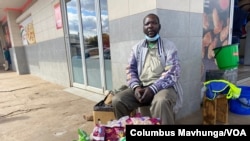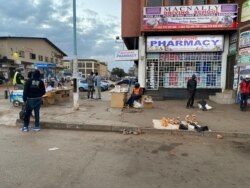Rights groups in Zimbabwe are expressing concern about vulnerable groups after authorities imposed a new, strict lockdown to curb a spike in coronavirus infections. The restrictions come as Zimbabwe's number of confirmed infections has more than doubled in the past week.
Monica Mutsvangwa, Zimbabwe’s information minister, told reporters late Tuesday that a recent spike in COVID-19 cases has forced authorities to impose tighter restrictions.
Officials had already imposed a nighttime curfew last week.
“Exemption mechanisms which were used during the first lockdown in 2020 will be reactivated with immediate effect. This will reinforce the current efforts of containing the spread of COVID-19. Stiffer penalties will be imposed for violations of COVID-19 restrictions, including the withdrawal of business operating licences. As you might be aware, the entire country is now under Level 4 lockdown,” said Mutsvangwa.
Samuel Wadzai is head of the Zimbabwe Vendors Initiative for Social and Economic Transformation. He says his group opposes the reintroduction of exemption letters that only allow essential workers, such as police and government employees, to reach their jobs.
“We just hope that it is going to be instituted in a transparent manner. In the past we have seen these exemption letters being used to block the operations of informal traders. It is our hope that there will be clear communication of where the informal economy will get the letters, and there will be enough measures that one gets these letters in a manner that does not promote corruption,” he said.
Mutsvangwa said the government is also intensifying its vaccination program as part of an effort to contain the pandemic.
About 810,000 Zimbabweans out of a population of 14 million have received their first shot, and about 575,000 have received their second inoculation since the program started in February.
Dewa Mavhinga is the head of Human Rights Watch in southern Africa. He said the government should concentrate on vaccinating the adult population and essential workers instead of tightening lockdown regulations.
“This is to get to the wrong end of the stick because this will not in a big way address the real challenges. The government is focused on a heavy-handed response that is not suited for the Zimbabwean context. Particularly when you look the vast majority of Zimbabweans who live in poverty, who depend on the informal sector for their livelihoods, who have nowhere to get the exemption letters to travel. We also know that the government of Zimbabwe is also not supporting these people in terms of intervention packages,” said Mavhinga.
Last year the government said it was giving about $10 to each family affected by lockdown regulations.
On Wednesday, most vendors did not take heed of the government’s call to stay at home unless they have exemption letters.
One of them is Lucia Mtetwa, who sells second hand clothes.
“I only see corruption increasing because of these letters because everyone wants to go somewhere – with an exemption letter or not. This only gives police an advantage. They will start demanding bribes as they were doing during the last time during the lockdown,” said Mtetwa.
Zimbabwe has 56,014 confirmed coronavirus infections and 1,939 deaths, according to Johns Hopkins University, which tracks the global outbreak. The numbers have more than doubled in the last few weeks.





